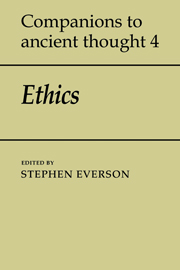Book contents
- Frontmatter
- Contents
- 1 Introduction: virtue and morality
- 2 Pre-Platonic ethics
- 3 Platonic ethics
- 4 Aristotle on nature and value
- 5 Some issues in Aristotle's moral psychology
- 6 The inferential foundations of Epicurean ethics
- 7 Socratic paradox and Stoic theory
- 8 Doing without objective values: ancient and modern strategies
- 9 Moral responsibility: Aristotle and after
- Bibliography
- Index of names
- Index of passages discussed
- Index of subjects
2 - Pre-Platonic ethics
Published online by Cambridge University Press: 05 June 2012
- Frontmatter
- Contents
- 1 Introduction: virtue and morality
- 2 Pre-Platonic ethics
- 3 Platonic ethics
- 4 Aristotle on nature and value
- 5 Some issues in Aristotle's moral psychology
- 6 The inferential foundations of Epicurean ethics
- 7 Socratic paradox and Stoic theory
- 8 Doing without objective values: ancient and modern strategies
- 9 Moral responsibility: Aristotle and after
- Bibliography
- Index of names
- Index of passages discussed
- Index of subjects
Summary
Although ‘ethics’ is a term that comes to us from the Greeks, Greek moral philosophy is notably different from typical modern discussions that fall under the same rubric. Some of our key moral concepts are absent or inconspicuous in Greek ethical debate. For example, much of modern ethics gravitates around the concepts of duty or moral obligation and rights, but neither of these concepts has any equivalent or close analogue in Greek speculation about how one ought to live. Similarly, the various oppositions between egoism and altruism or benevolence have no direct parallel in the ancient discussions. Since the Greeks have no counterpart to the Biblical injunction, ‘Thou shalt love thy neighbour as thyself’, the question of altruism or benevolence is not a central moral issue. The ancient gods made relatively few moral demands upon their worshippers. There is no Greek parallel to the Ten Commandments, or more generally to the Biblical notion of God as moral lawgiver. As a consequence of this fact, there is also no Greek equivalent to the Kantian notion of the ‘moral law’, as the secular, internalised version of divine command.
So much for the absence in Greek thought of some of the concepts that structure modern discussions in moral philosophy. On the other hand, the Greek moral vocabulary is dominated by three pairs of opposite terms that have no direct equivalent in modern terminology. The basic terms of moral evaluation are good–bad (agathon–kakon), admirable–shameful or noble–base (kalon–aischron), and just–unjust (dikaion–adikon).
- Type
- Chapter
- Information
- Ethics , pp. 27 - 48Publisher: Cambridge University PressPrint publication year: 1998
- 4
- Cited by



